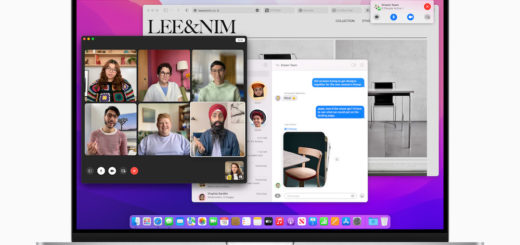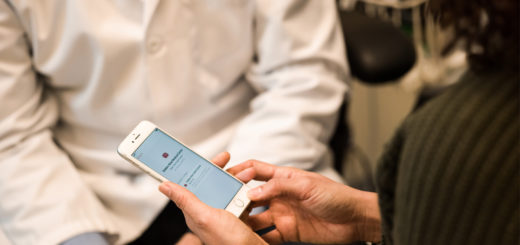Everything Apple CEO Tim Cook told Fox (rushed transcript)
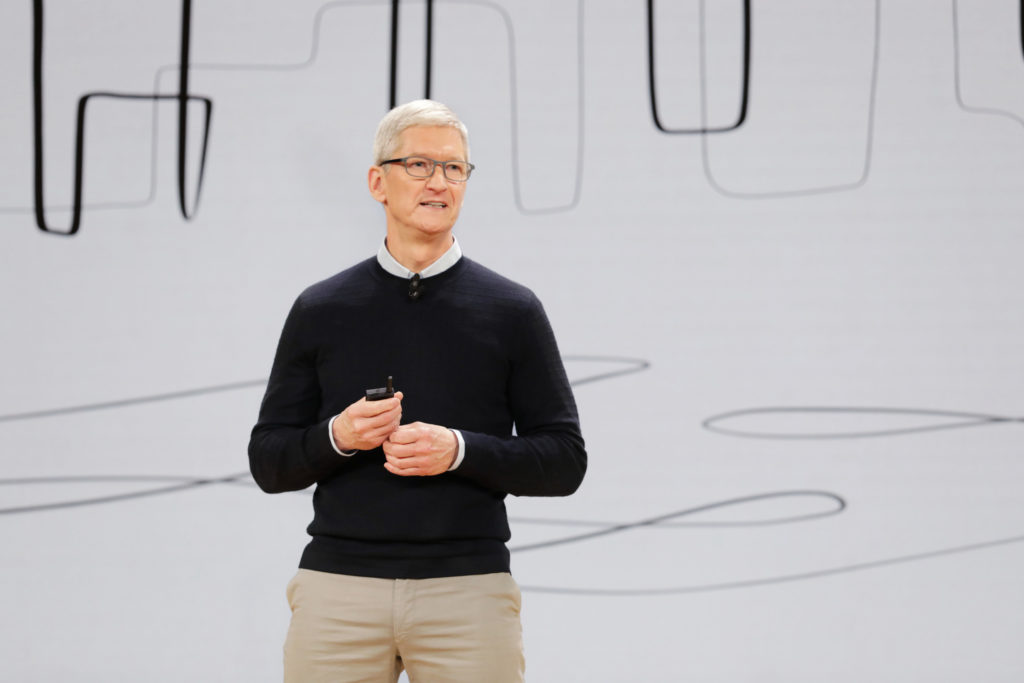
Tim Cook speaks
Apple CEO, Tim Cook was in Birmingham, Alabama this week, to introduce a brilliant Apple-supported project to use education to boost diversity and equality, this time with a project on the civil rights movement.
While there he spoke with Susan Li at Fox Business, who have provided the following rushed transcript of the interview, which aired on the afternoon of February 28. Headlines and images in this provided by me.
Everything Apple CEO Tim Cook told Fox
Not every person who wants to know about this will be able to watch the interview (though if you can it is available here), so I’ve reproduced this here for your convenience.
On Alabama
SUSAN LI, FOX BUSINESS NETWORK CORRESPONDENT: How does it feel to be home for you?
COOK: It’s very special. It’s always special coming home, but it’s even more special coming home and bringing a message about — that education is the great equalizer and actually helping to fulfill that dream along with lots of community leaders here and other companies.
On Education Fam
LI: So Birmingham is the first place for an education farm, and I’m just wondering from your perspective, being someone that grew up in this state, being the first in your family to get an education, how does it feel to be back, to be able to give back to the community in this way?
COOK: It makes my heart sing, to just say it simplistically. You know, there’s so much that we can all do from an equality point of view, but one of the most important — maybe the most important is education.
And so if we can bring coding in, if we can bring creativity skills, if we can bring the intersection of those two things together, people will have an incredible future. And that’s — that’s what we’re all about.
LI: Yes, so the education farm is providing coding opportunities for underserved parts of the community, and talking to some of your administrators and your educators, some of these students are building their own apps.
COOK: They are.
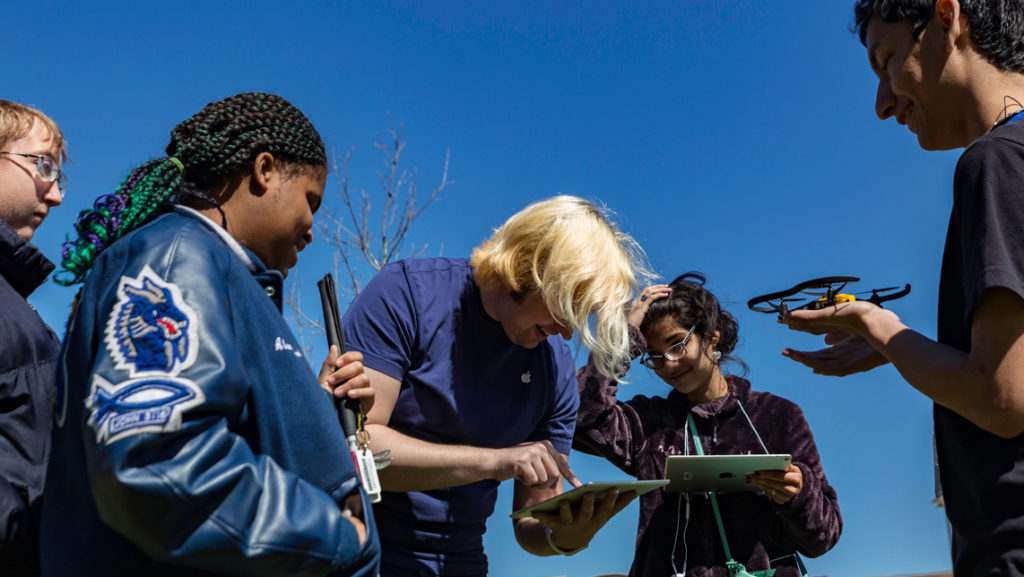
On the App economy
LI: I feel that it’s not talked enough about, about the app economy that Apple has built over the last 10 years, creating 1.9 million jobs.
COOK: This is enormous. You know, in 2008, the app store didn’t exist. And so you just look back over this 12 year period, and as you say, it’s almost two million jobs in the app economy of the United States. People are able to write apps, to bring out their passion about a particular business, and they can do this out of their home, they can stay in one place that they want to be in, maybe they want to be in a rural town or whatever instead of moving to another place for a job.
And we’ve now paid out $155 billion to developers. I mean, this is just an enormous amount. And no one would have predicted this 12 years ago.
On U.S. and overseas jobs
LI: Yes. And so, also by the way, when you hear this criticism about not bringing back jobs from overseas to the U.S., are you think the app economy, we’re creating high-paying, high-valued jobs, and that’s what Americans should want?
COOK: Yes, and I’m – I’m all good for creating more as well. You know, our total in the United States is now 2.4 million, and a lot of those are in manufacturing. And we continue to look for other ways to bring more manufacturing to the United States, advanced manufacturing, kind of products.
And of course we develop in the U.S. And so the vast majority — almost all of our engineering and research and development is in the United States. And so this is our home. We’ve committed to invest $350 billion here by 2023. And we are on track to doing that.
There’s probably no better gift than – that a business can give than giving back into an investment point of view that creates jobs and opportunity for people.
LI: And your community education initiative also fulfills part of your commitments to the workforce development initiative at the White House as well.
COOK: It does.
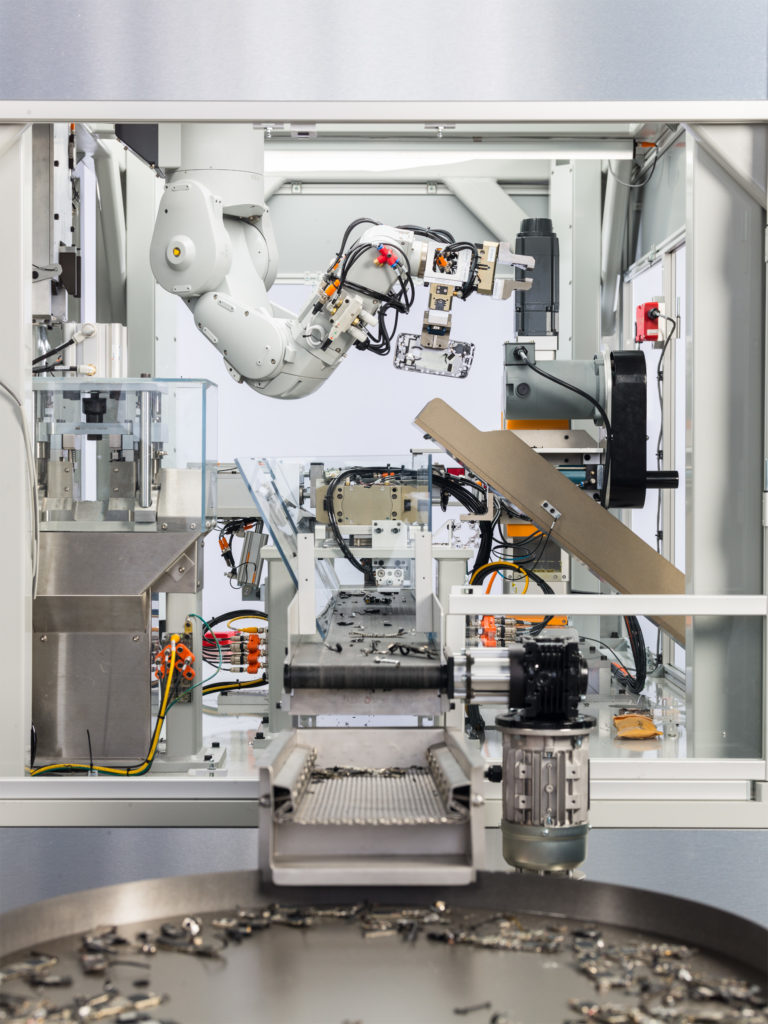
On the automation era to come and lifelong education
LI: And that’s to prepare America for the automation era.
COOK: Yes.
LI: Do you think America is prepared enough?
COOK: Today, no. No, I think the thing that we missed in the past about education is that lots of people thought education was something you do one time in life. You know, you go to K-12, you go to college and then you’re signed off.
Well, things are moving so fast now, technology is moving so fast, that all of us have to be lifelong learners. And so you need an adult learning community. That is here with the ed farm, which I’m totally thrilled about.
Also, the skills that people need as they graduate have changed. We believe that every child should understand coding before they graduate. And so the act of bringing coding to schools in Birmingham city, big deal for us.
And lastly, creativity is such an important skill, and in too many schools, the music and the arts have been neglected. And so we found a way to bring the creativity skills into other classes like math and science and so forth, in order to make sure that those skills aren’t forgotten either. And so we’re bringing all of that together here and it feels sensational.
On China and Coronavirus
LI: Now, I have to ask you about what’s happening over in China and the Coronavirus. You have said before that your first priority in China are your partners and your employees.
COOK: People.
LI: What’s the update on Coronavirus for Apple?
COOK: Well, it — first of all, let me say again, because I think it’s so important in an environment where people are trying to get well and health professionals are putting their wellbeing on the line to help people get well, that we’re human beings first and business leaders second. And so that — that is my philosophy and so people are number one.
In terms of our business, here’s what we’re saying to give you a flavor for what’s happening on the ground is we had closed — I’ll talk about the stores first. We had closed stores — all of our stores.
Now we’ve reopened the vast majority of them. And so we were able to put the necessary conditions in place to reopen the store. We’ve reopened the vast majority of them, over 80 percent.
Now that we’ve done that, the focus is now on ramping up the stores. And that — that will be more of a function of extending the hours to normal hours, but also people having the confidence that they can be in a place where other people are.
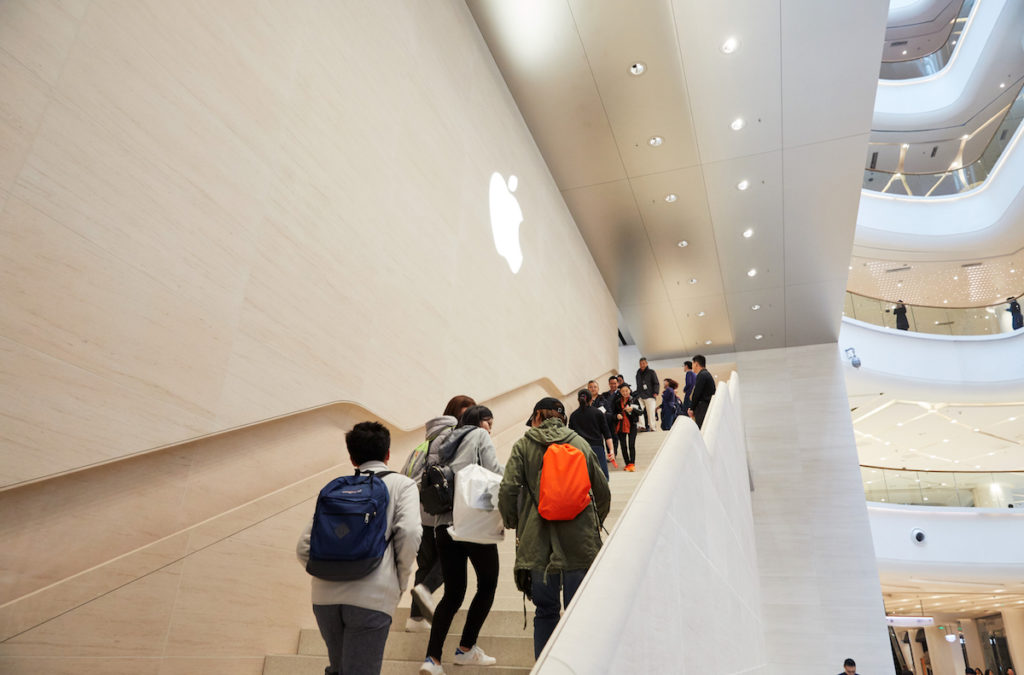
Chinese shoppers climb Apple’s stairs.
And how long that takes, I don’t know. But I’m optimistic there. It feels to me that China is getting the Coronavirus under control. I mean you look at the numbers; they’re coming down day by day by day. And so I’m very optimistic there.
On the supplier side, we have suppliers — you know, iPhone is built everywhere in the world. We have key components coming from the United States; we have key parts that are in China, and — and so on and so forth.
When you look at the parts that are done in China, we have reopened factories. So the factories were able to work through the conditions to reopen. They’re reopening. They’re also in ramp.
And so I think of this as sort of the third phase of getting back to normal. And we’re in phase three of the — of the ramp mode.
And I — things are going pretty much like we thought they would go there in terms of bringing things back. And so it’ll — it will take some time, but by in large I think this is a temporary condition, not — not a long term kind of thing. You know, Apple is fundamentally strong, and that’s — so that’s how I see it.
On the impact on results
LI: Do you anticipate disruption as the last past the second quarter?
COOK: Well the — our second quarter is the quarter we’re in, just to be clear with our investors, right, is the March quarter. Your calendar first quarter. And so I don’t know the answer to that yet.
We’re still in February and you know, there’s a reason for optimism but we’ll see. You know the — I think that the focus in the last few days have turned off of China onto Korea and Italy.
And so I think it’s very important to see what happens there and whether something new comes out of that. Our supply chain is — is relatively more imported in China. But — but we have great businesses in Korea, and we have suppliers in Korea as well, and suppliers in Italy and a great business there as well. So we need to see as that unfolds.

Media and analysts arrive at Apple’s iPhone event
On the stock market
LI: Well, the stock market obviously is reacting, and Apple has been down in –
COOK: Yes.
LI: — the past few weeks. For someone that creates value inside America’s largest company, do you think there’s value that investors are missing?
COOK: Well, my perspective — I don’t — first of all, I don’t really focus on the short term gyrations of the market. I — I think, for me and with the way we run the company, we work to the long term, and I see no long term difference between what was happening four weeks ago versus what’s happening today.
And so the market takes time to recognize that and so forth, and it’ll do what it’s going to do. And I’m the last person to be able to predict it.
But I would — you know, for me I look through that, look through the noise and — and concentrate on the future. And the future looks very bright.
On share buy backs
LI: You might be able to Apple at a discount — a 15 percent discount.
COOK: Well, we are a buyer. Right. You know we have a share repurchase plan, and so yes.
LI: This might be an opportunity to maybe up those share repurchases for Apple.
COOK: I won’t — I don’t want to announce anything on the air, but we — everybody knows that we’re buying — we’re buying shares and if the stock is lower, you buy more shares for the same amount of money, so.
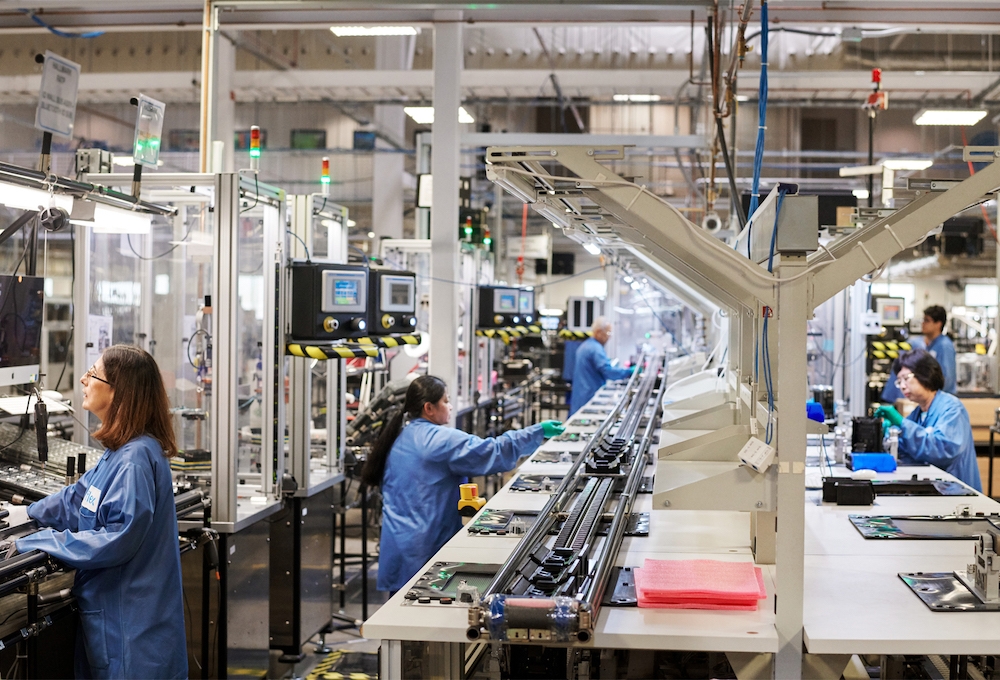
Apple already provides manufacturing jobs in the U.S.A.
On Apple’s in time supply chain
LI: Now you’re the architect of this low inventory fast moving supply chain that Apple currently has. Do you have any, I guess, ideas to maybe bring back or move some of that supply chain outside of China more?
COOK: Well, it is important to recognize that — that our products are built everywhere. I mean they are truly global products. And so you have several parts that are made in the United States that serve the world. So not only for the iPhones sold in the United States, but those are sold around the world.
And so what will happen to the supply chain as we look back on this, I wouldn’t want to say at this point, because the question for us always is what kind of resilience did the supply chain have.
It’s not was there a problem, because there will always be unpredictable things that come up, but as you know from following us, we’ve worked through earthquakes, tornados, fires, floods, tsunamis, SARS.
And so we’ve had a long list of things, and the operational team is very deep at working through these. And so the question for us after we get on the other side will be, was the resilience there or not and do we need to make some changes.
My perspective sitting here today is that if there are changes, you’re talking about adjusting some knobs, not some sort of wholesale fundamental change.
On diversification of manufacturing
LI: So you don’t anticipate then moving, say to other low-cost countries like the Vietnams or the Cambodias? Because some people have called this an inflection point for China’s manufacturing industry, especially with the disruptions that have been caused and people are uncertain at this point because China’s not cheap anymore, let’s be honest, right?
COOK: I — you know, yes, that’s the thing that people don’t understand, I think, is that there’s a perspective that — is that China is, but it hasn’t been for a long time, as both of us know.
And so — but for us, we’re not really fixated on cost only, Cost is one factor, clearly. But we’re also — we’re fixated on quality. And we’re focused on time to market, and the speed, and the depth of engineering in the different places.
And so somebody would have to meet all of those in order for us to dos something.
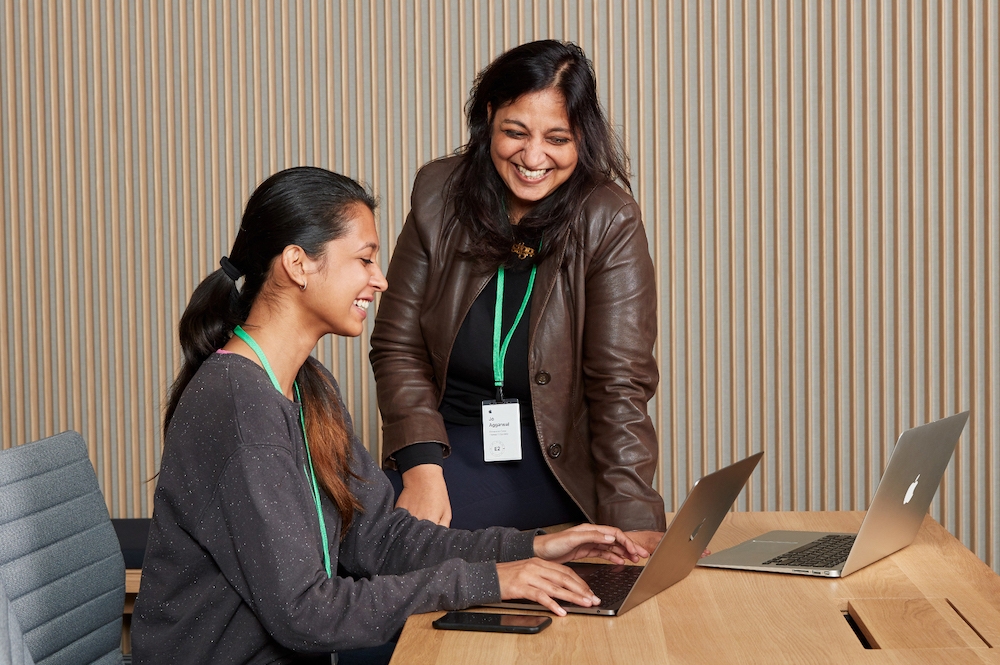
India-based tech firm, Wysa founder and CEO Jo Aggarwal and product engineer Anurita Srivastava at Apple Entrepreneur Camp 2019.
On opportunity in India
LI: Yeah, and announcing also your first retail store in India by the year 2021.
COOK: Yeah, I’m excited about that, because I see India as a huge opportunity for us. For years we could not enter there unless we entered there with a partner, into retail, and we did not want to do that, you know? We want to maintain control over our brand and so forth.
But the administration worked on this with the Indian government, and that change has been made. And so we are very, very positive about entering in there on online this year and retail next year.
On the U.S. and its administration
LI: Yes, speaking of the administration —
COOK: Yeah.
LI: I’m sure you get asked this all the time, but when people see Tim Cook on one side, Donald Trump on the other — they see a lot of difference, but you have been able to engage and work together. So how does the relationship work?
COOK: Well there are differences, there’s no doubt about that. But you look for intersections. And I care a lot about creating jobs, and I think the president does as well.
I care a lot about training the workforce for the future, and the administration is really focused on this as well.
I think one of the U.S.’s major challenges is to solve this issue. It’s that, as technology speeds over and over again and jobs are disrupted and jobs are created, we have to make sure our education is preparing people for the disruption and the creation.
And I think if we do that we can flourish in this environment, but if we don’t, we leave a lot of people behind. And that should be unacceptable for all of us. And so these are just two of the things that — where there’s intersections.
And I think — I think most people would say those are nonpartisan, you know? The creation of jobs should be nonpartisan, the education should be nonpartisan.
Policy, not politics
And so that’s how I see it, you know? We’re very focused on policy, not politics, that probably helps.
I think — we don’t have a pact — you know, we’re probably the most nonpolitical company out there. We don’t give to political campaigns, candidate campaigns and so forth.
But we do focus on policy, because we want to be a contributing citizen of the United States and to help the country every way we can.
LI: Now some would say that you were probably one of the first, if not the first, in Silicon Valley to reach out and engage with the White House. Recently Larry Ellison of Oracle held a fundraiser for President Trump receiving a lot of backlash from his employees.
Have you received any sort of criticism for trying to engage and work with the White House from your employees?
COOK: Well we have a large employee base, and people are welcome to have the views that they have, but I try to do what I say, and say what I do, right?
And my perspective is engagement is always best. Because just simply standing on the sideline and yelling doesn’t accomplish anything but polarization.
And so I want to suit up and play a role, and if I disagree on something, I want to try to influence it. If I agree on something, I want to try to amplify and figure out a way that I can help in some way and be a great citizen of the country.
So that is my perspective on things, and the way that we try to lead the company.
Please follow me on Twitter, or join me in the AppleHolic’s bar & grill and Apple Discussions groups on MeWe.
